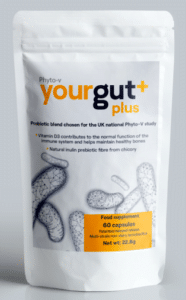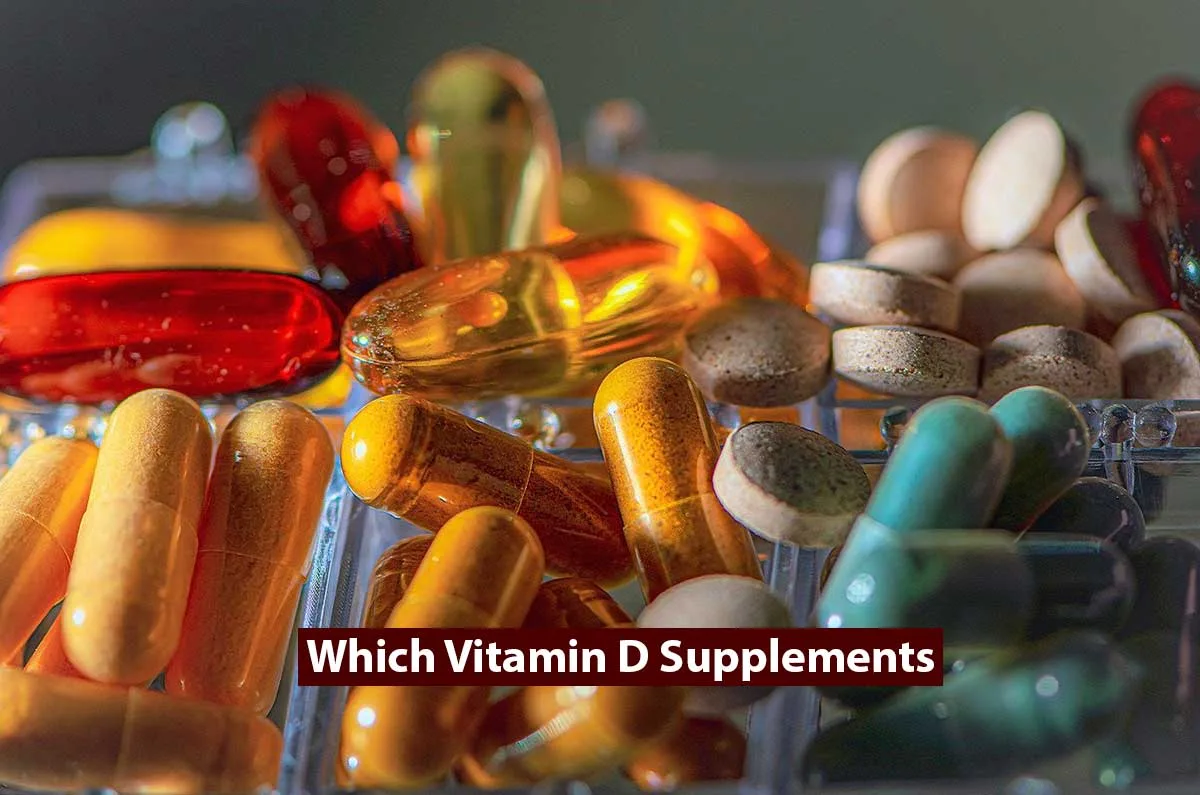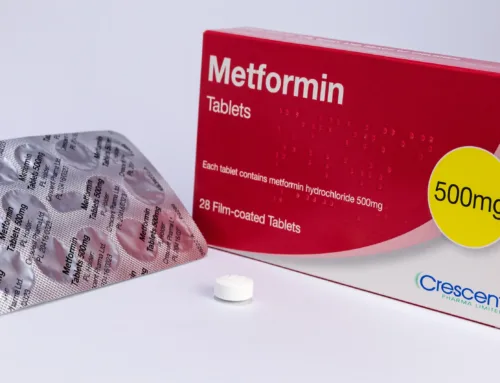According the recent biobank study a quarter of us in the UK are deficient in Vitamin D. Official government advice is now to take a supplement especially in the darker months but there’s remains confusion on how much to take and what type.
So – is there any evidence that it’s better to take vitamin D in capsules, sprays or gummies , should we take Vitamin D2 or D3 or combined with K2, probiotics or minerals or are these tactics to get us to spend more of our hard earned money?
.
 Why is vitamin D important?
Why is vitamin D important?
Most of us are familiar with the links between low vitamin D and weak bones such as rickets and osteoporosis. But vitamin D has a host of other important roles in the body – People living with low levels are more likely to:
- Catch severe flu and COVID
- Have immune related disorders such as allergies, urticaria, asthma and skin disorders
- Experience low mood, depression, seasonal affective disorders (SAD),
- Suffer from poor concentration, insomnia and reduced memory
- Increased risk of diabetes, heart attacks, stroke, dementia, Parkinson’s & cancer
In fact, there’s a 10% increased risk of death from prostate cancer for every 20 nmol/L increment below normal. After breast cancer, low vitamin D increases the risk of relapse. All patients respond better to treatments and have lower risks of serious side effects such as peripheral neuropathy.
Low vitamin D is linked to fatigue, demotivation to train and reduced exercise performance. A recent nutritional intervention study showed increasing Vitamin D along with other foods improved grip strength an important biomarker of longevity.
.
Where can we get vitamin D naturally.
Small quantities are found in nuts, egg yolks, fresh vegetables, fatty fish, mushrooms, grains, and meat from grass-fed animals. The skin produces >80% of the body’s vitamin D following sunlight exposure. Without sun, even with a good diet, vitamin D levels drop by half every 6 weeks so, unless we take positive action, we will have less than a quarter of the optimal levels of Vitamin D in our bodies by January. Investing in a winter holiday, in the sun, budget allowing, taking sensible precautions is an excellent way to top up levels. For the rest of us, a Vitamin D supplement remains the only reliable option – but which one?
.
How much vitamin D should we take ?
The official recommended daily amount (RDA) for adults is 600iu (15 mcg) but this is based on the prevention of rickets. Also the absorption of vitamin D varies form one person to another especially related to gut health. In general, Doctors and nutritionists generally agree that that to achieve levels at the upper end of the normal range 1000iu would be needed. Also, in order to correct a known deficiency it would good to take 3000iu for a few months then drop down to 1000iu to maintain healthy levels.
.
What is the best type or formulation or vitamin D:
.

Vitamin D in gummies, sprays or capsules: Research from Sheffield University demonstrated that taking vitamin D by oral spray is just as effective as taking a tablet so this may be a practical option for kids instead of swallowing a capsule. A study from North Carolina, USA found that the absorption of vitamin D from gummies was slightly better than capsules but not to any important amount. Gummies are certainly a more attractive to children, and some adults, so may improve compliance. The negative effects of the sugar, sweeteners and colouring content, however, is a concern and is also a risk that, as they look like ordinary sweets, they can be overdosed.



.
In conclusion
It’s important to maintain healthy levels of vitamin D. Some of us have the luxury of a couple of winter holiday in the Sun but most of us should take a supplement between 1000iu – 200oiu. The best forumulations combine vitamin D with probiotics such as lactobacillus. It would be sensible not to overdose, especially in the longer term – Your body cannot get too much vitamin D from sun because the skin limits the amount it manufacturers. It’s vital to remember, however, that for most minerals and vitamins, more is not better as excess levels can do harm. Vitamin levels greater than 375 nmol/L (150 ng/mL) can cause nausea, vomiting, muscle weakness, confusion, pain, loss of appetite, dehydration, excessive urination and thirst, and kidney stones. For these reasons, many nutritional institutions advise not going over 3000iu per day.
References
- Grant et al Evidence that Vitamin D Supplementation Could Reduce Risk of Influenza and COVID-19 Infections and Deaths Nutrients. 2020 Apr 2;12(4). pii: E988. doi: 10.3390/nu12040988.
- Lazzeroni M et al. Vitamin D and cancer: review of RCT’s. Anticancer Agents Med Chem 2013;13(1):118.
- Gupta P et al. Vitamin D and prostate cancer risk. Prostate Cancer Prostatic Dis. 2009;12(3):215
- Vitamin D, sunlight and prostate cancer. Anti-Cancer Agent Me 2013;13(1):45-57.
- Chiang et al. The Anti-cancer Actions of Vitamin D. Anticancer Agents Med Chem 2013;13(1):126-39.
- Zgaga L et al. Vitamin D Influences Survival After Colorectal Cancer. JCO2014;32(23):2430-2439.
- Ng K et al. Vit-D Levels and Survival in Patients with Colorectal Cancer. JCO 2008;26(18):2984-2991.
- Rose et al. Vitamin D and early stage breast cancer prognosis: a meta-analysis. BJC 2001;85(10):1504.
- Mondul et al. Vitamin D and Prostate Cancer. Cancer Epidemiol Biomarkers Prev 2016; 25(4):665.
- Pilz et al. Vitamin D and cancer mortality: systematic review. Anti-Cancer Agent Me 2013;13(1):107-117.
- Giovannucci et al. Vitamin D and colorectal cancer. Anticancer Agents Med Chem 2013;13(1):11-19.
- Luscome et al. Prostate cancer associations with sunlight. Breast Cancer Res Treat 2013;141(3):331.
- van der Rhee et al Prevention of cancer by sunlight is more than just a vitamin D? EJC 2013; 49(6):1422.
- Garland et al. Meta-analysis of All-Cause Mortality According to Vit-D. A J Pub Health 2014; 104(8): e43.
- Wang et al. Vit-D and Chronic diseases. 2017 Aging Diseases. 2017; 8(3): 346.
- Lappe et al. Effect of Vit-D on cancer incidence in older women. 2007 Am Society clin Nut 2007; 85. 6,1586
- Lapppe et al . A RCT of vt-D versus placebo to prevent cancer. JAMA, 2017; 317 (12), 1234.8.
- Jones ML, Martoni CJ, Prakash S. Oral supplementation with lactobacillus probiotic increases mean circulating 25-hydroxyvitamin D: a randomized controlled trial. J Clin Endocrinol Metab. 2013;98:2944–2951. doi: 10.1210/jc.2012-4262. [PubMed] [CrossRef] [Google Scholar]

 Why is vitamin D important?
Why is vitamin D important? 





This blog provides insightful guidance on choosing the right Vitamin D supplements, highlighting their health benefits, proper dosage, and quality considerations, making it a helpful resource for maintaining optimal wellness.